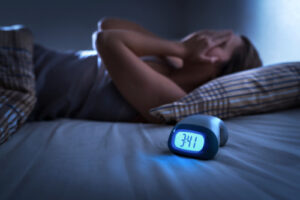
menu

Posted in Uncategorized | August 23, 2021

Are you having difficulty sleeping through the night or wake up feeling exhausted, even after you’ve been asleep all night? These are some signs of a condition called sleep apnea.
When your upper airway becomes blocked or collapses while you’re sleeping, it causes you to stop breathing a dozen times every hour and throughout the night. Sleep apnea is something that millions of people are diagnosed with every year.
Experiencing interruptions in breathing while you’re sleeping can prevent your entire body, including the brain, from getting enough rest. Untreated, this potentially serious sleeping disorder increases your risk for diabetes, high blood pressure, stroke, cognitive issues, and heart diseases, among other health problems.
Keep reading for 13 signs you may benefit from undergoing sleep apnea treatment!

Whenever the muscles in your throat relax, it’s a sign that your airway is partially blocked. When the airway suffers any blockage, it results in vibrations every time you breathe, causing snoring.
If you snore often and loudly at night, this could be an indication of having sleep apnea. Even if you’re snoring softly or it’s more irregular, this is still one of the most obvious signs of sleep apnea.
That’s why you should never ignore snoring. Although snoring and having sleep apnea often go hand in hand, it’s important to note that not everyone who snores has sleep apnea.
Do you sleep straight through the night, yet you still feel tired, exhausted, and fatigued as you go about your day? Sleep apnea might be the culprit behind your constant fatigue, no matter how much sleep you get.
Daytime exhaustion due to poor sleep quality can impair your judgment, contributing to accidents at work and home. It can also make you more prone to mistakes and interfere with your productivity at work. This may make you feel like you’re in a constant fog, no matter what you do.

At night, sleep apnea causes you to stop breathing multiple times each hour. As a result, your brain wakes you up to ensure you receive adequate air.
This ongoing cycle throughout the night makes you feel irritable the next day and contributes to why it can feel like you never get a good night’s sleep.
If you have sleep apnea, you may find yourself frequently waking up at night and unable to sleep straight through the night. That’s because when you’re finding it difficult to breathe, this also automatically interferes with your quality of sleep.
Your bed partner might also notice you kick and jerk a lot in your sleep, in addition to snoring.

Patients with sleep apnea have their sleep disrupted several times in a night, which, unsurprisingly, takes its toll on how your brain functions.
Short-term memories are converted into long-term memories by your brain as you rest and sleep at night. Experts believe recurring sleep interruptions due to having sleep apnea disrupt the conversion of short to long-term memories, contributing to memory loss.
If it feels like your memory is no longer as sharp as it once was and you’re experiencing other signs of sleep apnea, this sleep condition may be at least partially to blame.
Another common sign of sleep apnea is needing to gasp for air while asleep. When your airway becomes blocked, it will cause you to wake up abruptly for a few seconds.
You may choke, feel out of breath, or start gasping for air while you’re still asleep.

A good night’s sleep is key to keeping your brain healthy. Having a healthy brain is necessary for learning and being able to remember information you’ve learned later on.
But for those struggling with sleep apnea, suffering from sleep deprivation leads to problems with concentration and paying attention. If you have sleep apnea, you’ll find it difficult to focus, make decisions, and even solve problems.

People with sleep apnea often experience headaches in the morning that can negatively impact their entire day, increase stress levels, and hurt their ability to be productive. How is sleep apnea connected to morning headaches?
Intermittent breathing because of sleep apnea cuts off your intake of receiving adequate oxygen. As your oxygen levels go down, the carbon dioxide levels rise, leading to the dilation of blood vessels close to your brain. The dilation causes pain, which is a headache.
Due to sleep apnea, frequent pauses in your breathing create a vacuum. The vacuum may pull stomach acid up into your throat.
As a result, you may develop chronic sore throats that you’re more likely to notice when you wake up in the morning.

Sleep apnea is usually related to persistent difficulty staying and falling asleep, known as insomnia. This is because your brain registers the suspension of breathing as life-threatening and prevents it by making you unable to fall asleep.
Chronic insomnia can result in depression, health-related complications, and decreased quality of life, among other issues.
Another tell-tale sign of sleep apnea is dry mouth because of blocked nasal passages that force you to breathe through your mouth instead of through your nose.

Sleep apnea is known to affect your mood. Therefore, be on the lookout for mood changes such as anxiety and loss of interest in sex.
Without a good night’s sleep, your chances of suffering from depression are increased. Studies reveal there’s a connection between sleep disorders and depression.
One research study found that almost 50 percent of the participants with sleep apnea also had symptoms of depression, along with symptoms of anxiety.
The experienced and compassionate team at Specialty Care ENT understands how sleep apnea can negatively impact your professional and personal life. That’s why we tailor treatment plans for patients to ensure they attain the high-quality sleep both their mind and body need.
Are you experiencing any of the symptoms mentioned above and suspect you could have sleep apnea? Schedule your appointment at Specialty Care ENT today to get the most accurate diagnosis and restore the restful sleep you need.